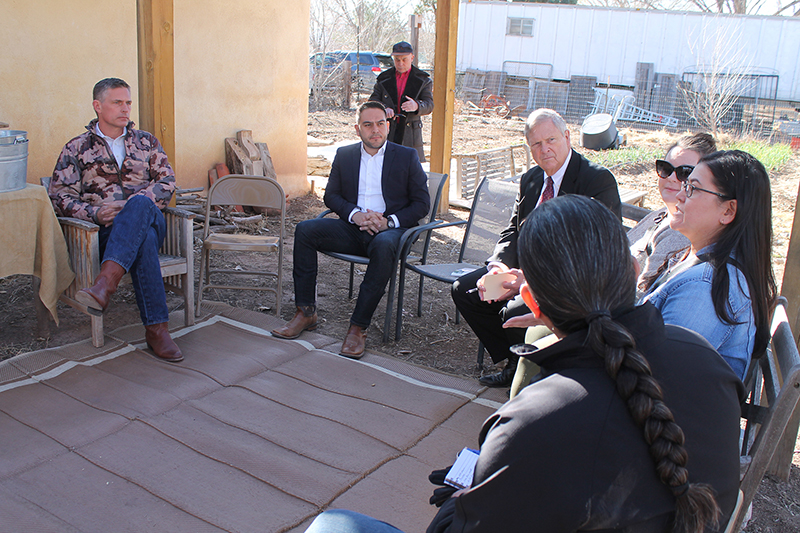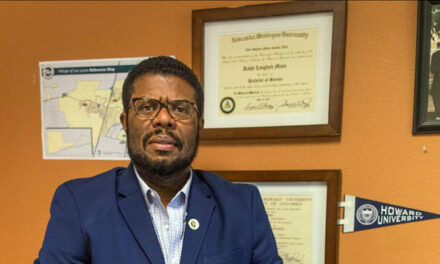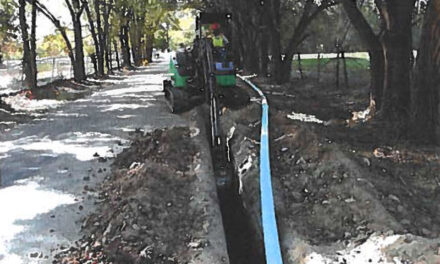PERALTA — It’s a different USDA.
That was the message Monday morning from U.S. Secretary of Agriculture Tom Vilsack as he toured a small farm in Peralta with Democrats U.S. Sen. Martin Heinrich and U.S. Rep. Gabe Vasquez. The three, along with a cadre of representatives from agriculture-focused non profits, local small growers and other government agencies, visited BlueFly Farms.
The three-acre enterprise was founded in 2013 by Kemper Barkhurst and Elizabeth Arnold. The farm produces lavender, naturally-flavored sparkling waters as well as natural bath and body products.
During a roundtable discussion of the needs of small, young farmers, Zoey Fink, who started Farm Shark, a diversified vegetable operation in Albuquerque’s South Valley in 2020 with her husband, Carlos McCord, pointed out having a small, diverse farm like they do can be challenging when applying for federal programs.
“A lot of federal programs don’t necessarily fit the kind of farm we have,” Fink said. “They are often asking for one type of crop on hundreds or thousands of acres.
“A specific example is the (Coronavirus Food Assistance Program) in 2020. They were wanting you to list every single crop and the dollar amount. We have 20 different vegetables on less than an acre. You don’t necessarily have the numbers to be able to fill in to access those kinds of programs.”

Julia M. Dendinger | News-Bulletin photo
U.S. Sen. Martin Heinrich, left, U.S. Rep. Gabe Vasquez, center, and U.S. Secretary of Agriculture Tom Vilsack visited BlueFly Farms in Peralta Monday morning, joining local, small farmers and agriculture-focused nonprofits for a roundtable discussion about ways the USDA can better assist small, diversified growers, as well as programs that focus on regenerative and climate responsible farming.
Sec. Vilsack said department officials realized it had created hurdles, and major changes were made to that program to make it more accessible to small-scale and diversified producers.
Sen. Heinrich acknowledged support of small, local producers was one way to address issues with nutrition and health care in communities.
“We need to figure out how we can do a better job making the programs fit the kind of production we’re seeing,” Heinrich said.
Rep. Vasquez agreed, saying Congress needed to have provisions in the farm bill that would meet the goals and needs of the realities of farming today, as well as taking the climate into account.
“Working with our colleagues across the aisle, who may not call it climate change and call it changing conditions, less water, changing seasons,” Vasquez said. “The point is the bill has to reflect the priorities we have as a dry state. There are a lot of issues mostly related to water, but also to generating the next generation of farmers.”
Linking small local growers to a large market for their products is a push the USDA is making, Vilsack said.
“It’s about a local, regional food system. We’ve given money to the state of New Mexico to essentially, as they purchase food for food banks, schools, a portion of those dollars go for local (agricultural) systems,” he said. “Now there’s hundreds of millions of dollars that are going, nationwide, to encourage a connection between small producers and big-time purchases.”
During a recent visit to a Colorado cantaloup grower with 100 acres, Vilasack said the producer is now at the point where he has pre-sold everything for this coming season to eight surrounding school districts.
“There’s a powerful opportunity here to better link local purchasers with local production,” he said. “Farmers markets are great, but institutional purchases — hospitals, schools, prisons, anyone who buys in bulk — should be buying (local) and we want to help you do that.”
In addition to establishing that link, the secretary said the department is looking at how its farm service agency and farm loan programs can be made more user friendly for beginning farmers.
Vilsack said the goal is “fashioning a farm bill that basically says, ‘It’s not get bigger or get out.’ It’s creating multiple profit centers and providing opportunities.”
Information about federal resources and programs for farmers can be found at USDA.gov.
Julia M. Dendinger began working at the VCNB in 2006. She covers Valencia County government, Belen Consolidated Schools and the village of Bosque Farms. She is a member of the Society of Professional Journalists Rio Grande chapter’s board of directors.

















